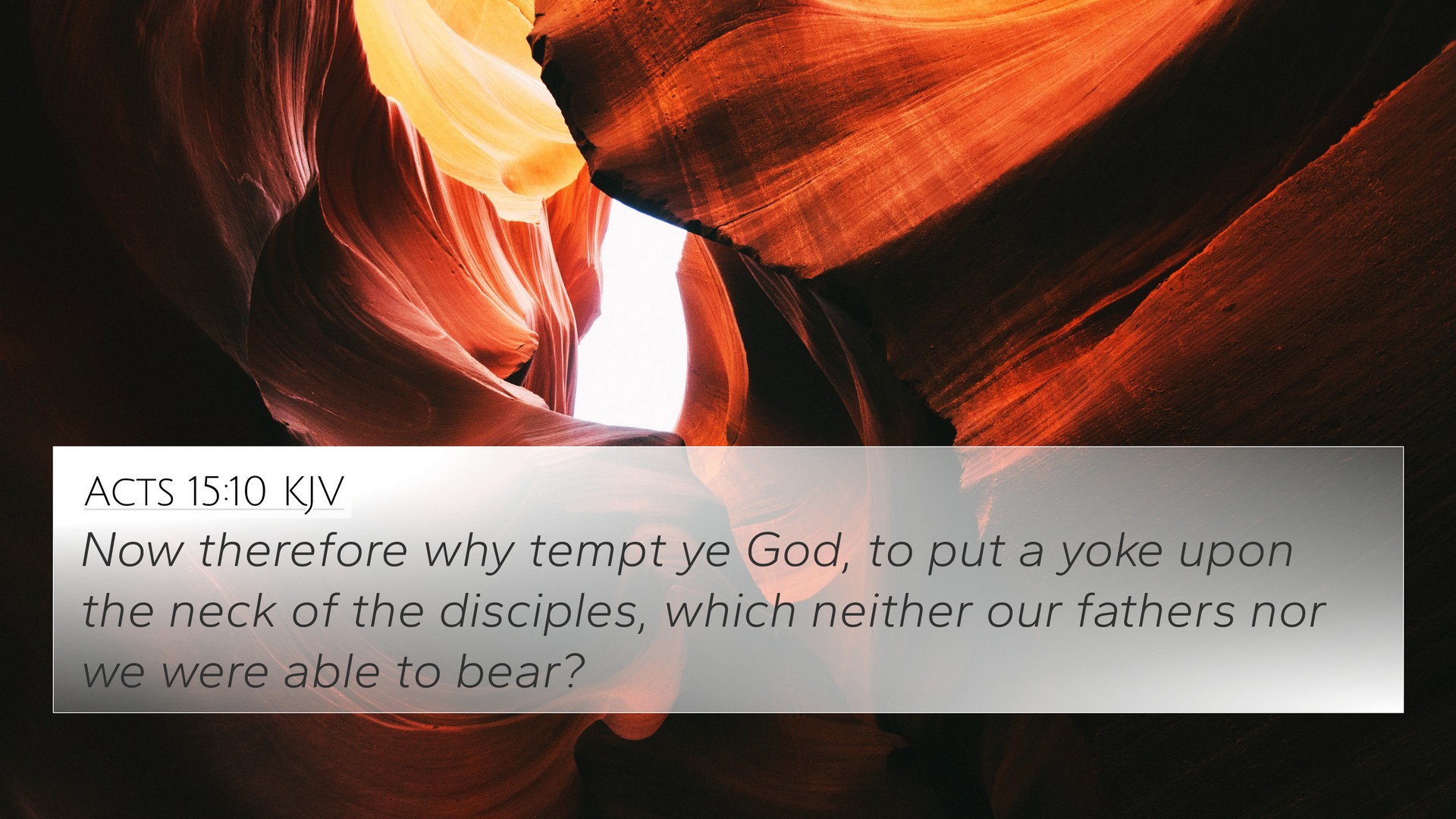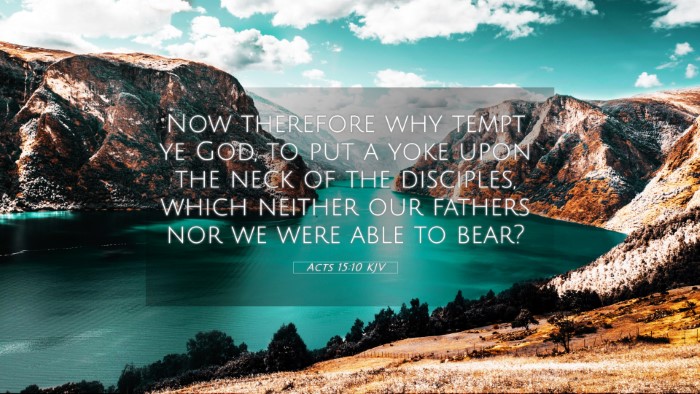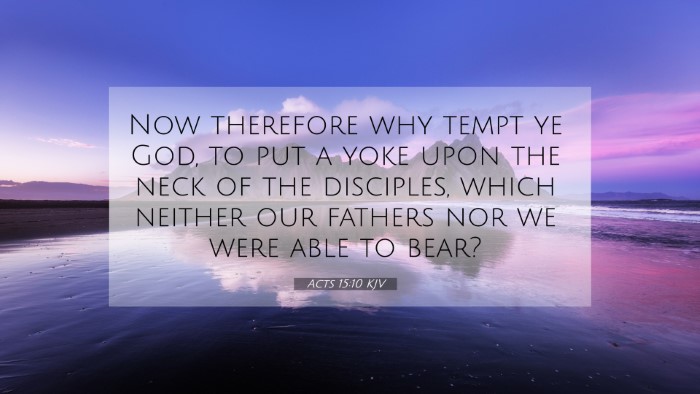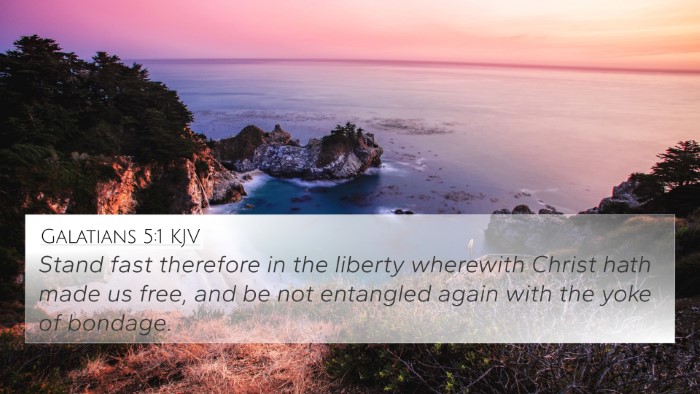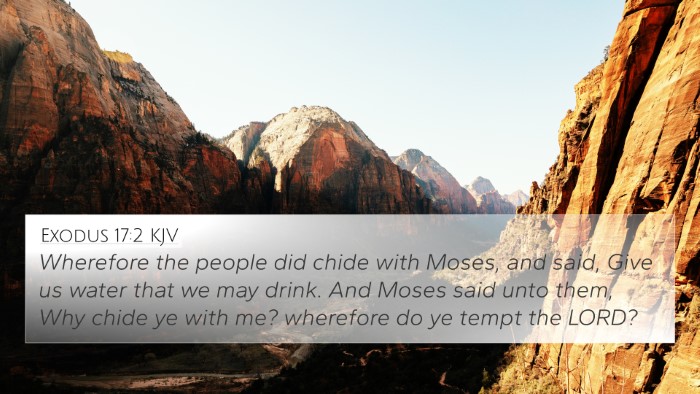Understanding Acts 15:10
Acts 15:10 states: “Now therefore why tempt ye God, to put a yoke upon the neck of the disciples, which neither our fathers nor we were able to bear?” This verse occurs in the context of the Jerusalem Council, where early church leaders were debating the necessity of imposing the Jewish law on Gentile believers.
Summary of the Verse Meaning
In this pivotal moment, the apostle Peter addresses the gathering by emphasizing the burden of the Mosaic Law, reflecting on the historical struggle the Jews had in fully adhering to it. Peter's declaration serves as a critical reflection on grace, underscoring the belief that salvation comes through faith in Jesus Christ rather than adherence to the law.
Commentary Insights
-
Matthew Henry: Henry highlights the futility of attempting to impose the law on Gentiles, arguing that it was a burden no one could bear. He notes that the law demonstrated the need for grace, which is fulfilled in Christ.
Key Point: The law is not a means of salvation; it instead points to the necessity of grace and faith.
-
Albert Barnes: Barnes emphasizes that Peter was addressing the hypocrisy of expecting Gentiles to adhere to the law when even Jews themselves struggled with its observance. He points out that imposing the law upon the Gentiles would be tantamount to testing God’s faithfulness.
Key Point: God’s grace through faith must be extended to all believers, regardless of their heritage.
-
Adam Clarke: Clarke discusses the “yoke” Peter refers to, explaining that it symbolizes the rigorous demands of the law. He argues that imposing such burdens upon new believers contradicts the message of liberation delivered through Christ.
Key Point: The yoke of the law is contrary to the freedom of the Gospel.
Connections Between Bible Verses
Acts 15:10 is deeply interwoven with numerous other scriptures, providing a robust framework for understanding the liberating essence of the Gospel. Below are important cross-references:
- Galatians 5:1: “Stand fast therefore in the liberty wherewith Christ hath made us free, and be not entangled again with the yoke of bondage.”
- Romans 7:6: “But now we are delivered from the law, that being dead wherein we were held; that we should serve in newness of spirit, and not in the oldness of the letter.”
- Matthew 11:30: “For my yoke is easy, and my burden is light.”
- Acts 13:39: “And by him all that believe are justified from all things, from which ye could not be justified by the law of Moses.”
- Romans 3:20: “Therefore by the deeds of the law there shall no flesh be justified in his sight: for by the law is the knowledge of sin.”
- Ephesians 2:8-9: “For by grace are ye saved through faith; and that not of yourselves: it is the gift of God: Not of works, lest any man should boast.”
- Hebrews 7:18-19: “For there is verily a disannulling of the commandment going before for the weakness and unprofitableness thereof. For the law made nothing perfect, but the bringing in of a better hope did; by the which we draw nigh unto God.”
Thematic Connections and Analysis
The themes woven throughout Acts 15:10 offer a rich tapestry that speaks to the nature of salvation, grace, and the human condition. By tracing the connections between prominent Biblical texts, one gains insight into a progressive revelation of God's plan.
The verse invites readers to delve deeper into exploring how various scriptures relate to key doctrines such as the role of grace, the function of the law, and the inclusiveness of the Gospel. This verse encourages a comparative Bible verse analysis, linking Paul's teachings with the insights from other apostles.
Utilizing Bible Cross-References
For those studying Acts 15:10, employing tools for Bible cross-referencing proves beneficial. Whether utilizing a Bible concordance or a Bible cross-reference guide, students of the Word can uncover deeper connections, enriching their understanding of the text.
Comprehensive Bible cross-reference materials can aid in identifying links between the Old and New Testaments, as well as drawing parallels between epistles and the teachings of Christ. Properly utilizing these tools can illuminate the transformative nature of the Gospel message.
Conclusion
Acts 15:10 thus stands as a profound reminder of the grace found in Christ, urging believers to embrace their freedom from the law while recognizing the weighty history that leads to this revelation. The insights gained from various commentaries and interconnected verses deepen one's understanding of Scripture and facilitate a powerful dialogue within the biblical narrative.
